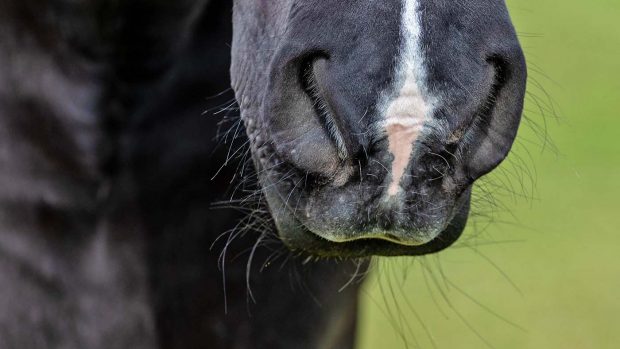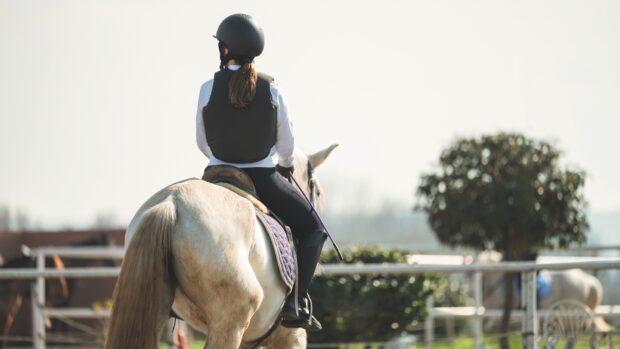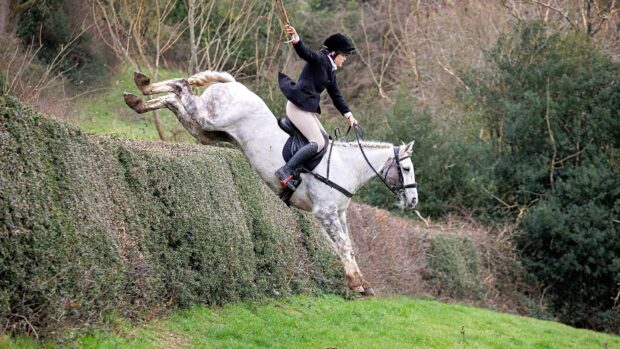A British writer has received an international literary award for the book she wrote about a life-changing trek across the Outer Hebrides with her horse and dog.
Karen Inkster embarked on the journey in a last-ditch bid to form a bond with her rescue standardbred mare Connie, who vets had recommended she put to sleep because of aggressive behaviour.
She recorded the journey in her self-published book The Deaf, The Daft and The Ditsy, written in 2018, and has since donated more than £7,000 in profits from its sale to charities.
Karen told H&H she was “astonished” this week to receive an email from the US-based Equus Film and Arts Festival announcing that she had won the award for international equine adventure.
“Somehow, one of the people involved with the festival had heard about my book and asked me to submit it,” said Karen, who is based in Perthshire.
“I had seen they had a vast amount of entries, some from quite famous authors, so I didn’t watch the ceremony, which was held online this year because of Covid. It wasn’t until I woke up on Monday morning (30 November) and checked my email that I found out I had won.”
Karen’s adventure began when she acquired Connie through a rehoming agency and although she was not a rescue case, she had spent a few years unridden. It is thought she had been raced in harness as she paced, and it also became apparent she had several behavioural issues, including unpredictable, unprovoked biting and rearing under saddle.
“The £300 donation I paid for her ended up turning into thousands spent on vets’ bills trying to find out if there was something physically wrong with her. I even thought at one point she might have a brain tumour,” Karen said.
“She broke my ribs twice in 18 months and I just wasn’t getting anywhere. I’d tried working with several trainers but in the end I just decided I wanted to journey somewhere with her that we didn’t know.
“I wanted the chance to be with her 24/7 and for her to have to be part of the herd and rely on us, that was the mad idea.”
As Connie had “always loved” Karen’s deaf collie Pip, whom she had rehomed from the Dogs Trust, he went with them on their 21-day trek across the 13 remote islands. Karen rode the mare half the time and led her for the rest as she also had to carry the kit and camping gear.
“Because she used to have tantrums that would last for hours where she’d do mad things like run you over or smash through a gate, my vet had given me two syringes of sedatives to use in an emergency, for my safety and hers, but I never needed them,” Karen said. “By day four, things had started to change, that’s how quick it was.”
Karen said that by the time they were half way through the trip, she could throw the lead rope over Connie’s neck and walk ahead of her and she’d “stop for a munch and then catch up”.
“In the mornings, once it got light, her routine was to come and stand near the tent and paw the ground as if to say ‘get up, it’s a new day and a new journey’. She’d bring herself over to stand by the panniers to tack up, whereas at home I had to tie her up to do anything with her,” she said.
“I was very much aware it could have been a one-way trip if it didn’t achieve what I set out to do but sometimes these things take an act of courage or madness. We’ve had an amazing bond ever since and she came home a completely and utterly different horse.”
The trio crossed between the islands using causeways and bridges and Karen also took a lorry so they could travel between the islands where they had to take the ferry. She would corral the horses and go and pick up the vehicle, often accepting lifts from strangers who were happy to help.
“People were phenomenally generous and halfway through I did start to feel like a minor celebrity,” she said.
“While the scenery was just stunning, what I will remember is the people and their stories. So many people were happy to see a horse. There used to be a lot of ponies on the islands as they used to help with cutting the peat but they have been replaced by machinery.”
Continues below…

Top eventing stallion back from the brink and happy in work after life-threatening illness
“It’s nice to see him happy again; it was worth all the struggle”

Mare involved in ‘shocking’ neglect case receives animal hero award
She won the "back from the brink" category at the London awards ceremony *Warning: report contains images readers may find

Subscribe to Horse & Hound magazine today – and enjoy unlimited website access all year round
While Connie was quick to settle once they returned home, Karen said she struggled with “the blues” for a few weeks after coming back to normality but that it had been an amazing experience she would always remember. At 14, Pip is now too old to embark on a long trek but Karen hopes that further adventures will be in store for her and Connie and another project horse, a Spanish mustang, she acquired two years ago.
“He still needs some work on his issues but I am planning a thousand-mile trip round Scotland at some point,” she said.
All profits from the sale of Karen’s book are currently being donated to the SSPCA to help support hundreds of dogs and cats recently rescued from a Scottish puppy farm. Copies can be ordered via her Facebook page.
Horse & Hound magazine, out every Thursday, is packed with all the latest news and reports, as well as interviews, specials, nostalgia, vet and training advice. Find how you can enjoy the magazine delivered to your door every week, plus options to upgrade to access our H&H Plus online service which brings you breaking news as it happens as well as other benefits.




